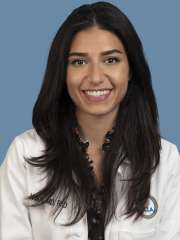Neuropathy Program
The UCLA Neuropathy Program was founded in 2020 and houses three robust areas of focus for clinical development and research innovation. Neuropathies are a category of conditions whereby the peripheral nerves are impaired or damaged secondary to direct injury or trauma, autoimmune, toxic, or genetic causes. Neuropathies can manifest in a multitude of ways including burning pain, numbness, tingling, weakness, imbalance and incoordination. Management or treatment of neuropathy is determined by the underlying cause.
There are hundreds of different types of neuropathies, our program at UCLA focuses on the toxic effects of anti-cancer drugs including chemotherapy and immunotherapy, cancer-related neuropathies, and genetic neuropathies with a particular focus on Hereditary Amyloidosis and Charcot-Marie-Tooth. There is a tremendous need to not only help patients clinically navigate neuropathy but to better understand potential means by which we can optimize nerve health.
Chemo-Neuropathy Program
The Chemo-Neuropathy program was piloted in 2022 and launched to UCLA Health Oncology in January 2023. The clinic cares for and manages peripheral nervous system toxicities related to anti-cancer drugs such as chemotherapy and immunotherapy. At present, it is the only standalone neuromuscular clinic dedicated to delivering this type of care in the United States.
We hope to identify factors that may predict or prevent the development of often debilitating toxicities related to these life-saving interventions.
Hereditary Amyloidosis
The UCLA Neurology Amyloidosis program is dedicated to the evaluation and management of patients with Hereditary Amyloidosis and other forms of Amyloidosis. This program has established a network of care streamlined across Neurology, the UCLA Cardiac Amyloidosis Center, Precision Health, and our Specialty Pharmacy.
Patients evaluated in the Neurology Amyloid Clinic receive expert care with genetic testing, family cascade testing, comprehensive neurologic evaluation and electrodiagnostic testing. Patients with uncharacterized or minimally reported variants in the transthyretin gene are welcomed for further evaluation.
CMT and other Genetic Neuropathies
UCLA has a broad cohort of patients with genetic neuropathies such as Charcot Marie Tooth. Pediatric and adult patients are evaluated in this context to help these resilient patients receive comprehensive care including diagnosis, management and when appropriate referral to partners in Orthotics and Prosthetics, Physical and Occupational Therapy.

Meet the Program Director
Dr. Anasheh Halabi is an Assistant Clinical Professor in the Department of Neurology and the Founding Director of the UCLA Neuropathy Program. She is board-certified in Neurology and Neuromuscular Medicine with a PhD in Genetics. Dr. Halabi teaches medical students in the David Geffen School of Medicine, Neurology residents, and fellows in Neuromuscular Medicine and Neurophysiology. In 2025, she had the tremendous honor of receiving the Department of Neurology Golden Hammer Award for outstanding clinical educator. Dr. Halabi has uniquely integrated her research background in genetics into her clinical practice to develop innovative collaborations across several disciplines at UCLA, and more broadly with industry partners.
If you’re interested in supporting this valuable work, consider contributing to the UCLA Neuropathy Research Fund.
To contact the UCLA Neuropathy Clinic, call: (310) 794-1195